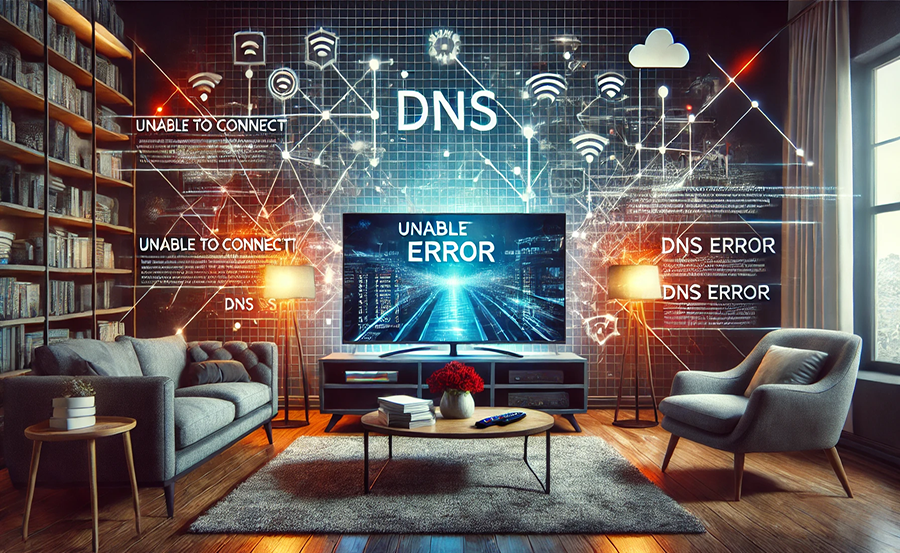In the world of IPTV (Internet Protocol Television), seamless streaming experiences hinge on effective DNS (Domain Name System) management. As technology advances, so do the complexities in broadcasting digital content over IP networks. Whether you’re a streaming service provider or an end-user, understanding how DNS impacts IPTV delivery is crucial. Today, we’ll explore 29 proactive strategies to combat DNS issues, ensuring your IPTV service runs smoothly.
Understanding the Basics of DNS and IPTV
The Role of DNS in IPTV Services
DNS acts as the backbone of the internet, translating domain names into IP addresses. In IPTV, DNS is responsible for directing traffic to the correct servers hosting video content. When DNS isn’t functioning correctly, users might experience buffering, disruptions, or even failures in connecting to streaming servers.
Consider DNS as a network’s GPS, guiding requests to their desired destinations efficiently. Without an accurate DNS configuration, the chances of misrouting or latency increase, impacting the viewer’s experience.
Smart Choice:
Experience top-tier entertainment with Best IPTV for USA and enjoy non-stop shows and movies.
Common DNS Issues in IPTV
Problems in DNS are not uncommon in IPTV services. These include issues like DNS server downtime, misconfigurations, slow responses, and security vulnerabilities. Each of these can severely affect the quality and reliability of IPTV streaming services.
For providers, recognizing these problems early is vital for maintaining service levels and customer satisfaction. Users, too, need to understand these issues to troubleshoot basic problems independently.
Proactive Approaches to Solving DNS Issues
Improving DNS Server Performance
A reliable DNS server is your first line of defense against streaming disruptions. Regularly updating DNS server software can help maintain performance and security. Additionally, consider monitoring server uptime to anticipate and resolve potential downtimes proactively.
One effective yet often overlooked tactic is diversifying your DNS servers. Using a mix of primary and secondary servers can reduce stress on a single server, minimizing downtime and optimizing load distribution.
Implementing DNS Caching
Enabling DNS caching reduces the time it takes to retrieve IP addresses by storing a local copy of DNS queries. This can significantly speed up the connection process for repeated requests and enhance the streaming experience for regular viewers.
Adjusting TTL (Time-to-Live) settings in your cache can fine-tune performance, allowing for quick updates without unnecessary stale data retrieval.
Using Content Delivery Networks (CDNs)
Content Delivery Networks can alleviate DNS strain by caching content closer to users’ geographical locations. This approach not only improves load times but can also reduce bottlenecks on central DNS servers.
CDNs can be particularly useful for IPTV providers aiming to distribute high-demand content swiftly without compromising on performance or quality.
Ensuring Network Security
Network security plays a crucial role in DNS integrity. Implementing DNSSEC (Domain Name System Security Extensions) can protect DNS infrastructure from malicious activities like cache-poisoning and spoofing attacks.
Regular vulnerability assessments and updates are necessary to maintain a robust defense against emerging threats, safeguarding both DNS servers and client devices.
Conducting Regular DNS Audits
Frequent DNS audits can reveal errors or inefficiencies in your DNS setup. These audits should include reviewing firewall settings, checking for misconfigured DNS records, and ensuring all software updates are applied promptly.
Audits can help in unveiling potential security risks or areas for performance improvement, ultimately enhancing the IPTV service reliability.
- Update DNS server software regularly to incorporate new features and improvements.
- Diversify DNS servers to distribute load effectively and minimize the risk of service interruption.
- Enable DNS caching to speed up repeat DNS queries and reduce server load.
- Use CDNs to alleviate the load on central servers, improving delivery speeds to end-users.
- Implement DNSSEC to secure DNS traffic against tampering and spoofing attacks.
- Perform DNS audits frequently to uncover and address potential issues proactively.
Managing User Experience in IPTV with Effective DNS Setup
Monitoring User Feedback
User feedback can provide insight into DNS-related issues. Implementing a structured process for collecting and analyzing this feedback can help IPTV providers address common concerns, adapt solutions, and enhance user satisfaction.
Tools like surveys, app store reviews, or direct feedback channels offer invaluable data on user experience, revealing both subtle and significant DNS troubles.
Optimizing Streaming Paths
Routing data efficiently is essential for an uninterrupted streaming experience. Optimize streaming paths by utilizing geo-DNS routing, which directs users to the closest servers, reducing latency.
Furthermore, maintaining a dynamic routing strategy allows IPTV services to adapt to network conditions in real time, ensuring an optimal balance between speed and reliability.
Leveraging Technology for Better DNS Management in IPTV
Adopting AI-Powered DNS Solutions
Artificial intelligence can revolutionize DNS management by predicting potential issues before they occur. AI-driven analytics can provide real-time insights into network behavior, enabling swift adjustments to DNS configurations.
Investing in AI solutions not only enhances DNS performance but also provides valuable data for strategic decision-making, ensuring consistent service quality.
Utilizing Smart DNS Services
Smart DNS services offer a flexible solution for bypassing geo-restrictions, allowing users to access global content seamlessly. For IPTV providers, incorporating Smart DNS functionality can extend content offerings to a broader audience.
Moreover, Smart DNS often ensures faster speeds compared to traditional VPNs, providing a smooth streaming experience without geographic constraints.
Exploring Blockchain for DNS Security
While still emerging, blockchain technology offers promising applications for DNS security, providing decentralized solutions that could eliminate single points of failure. This could transform how DNS records are managed, introducing a new level of transparency and resilience.
Exploring blockchain solutions positions IPTV services at the cutting edge of security innovation, laying the foundation for robust DNS management strategies.
FAQ Section

What is DNS and why is it crucial for IPTV services?
DNS, or Domain Name System, translates domain names into IP addresses. It’s crucial for IPTV because it directs user requests to the correct servers where video content is hosted, ensuring smooth streaming experiences.
How can Smart DNS improve my IPTV service?
Smart DNS enables users to bypass geo-restrictions, allowing access to a wider range of content globally. It typically offers faster connection speeds compared to VPNs, mitigating buffering issues for uninterrupted streaming.
Why should I consider AI solutions for DNS management?
AI solutions offer predictive analytics that identify potential DNS issues before they manifest. This allows IPTV providers to make real-time adjustments, saving time and maintaining consistent service quality.
What are the benefits of using a CDN for IPTV services?
CDNs cache content closer to users’ locations, reducing load times and alleviating pressure on central DNS servers. This setup enhances user experience by delivering content faster and more efficiently.
How do DNS audits contribute to better IPTV service?
Regular DNS audits identify system inefficiencies or security vulnerabilities. By addressing these proactively, IPTV providers can ensure a more reliable service and mitigate potential streaming disruptions.
Is blockchain a viable solution for DNS management in IPTV?
Blockchain offers decentralized DNS management, reducing single points of failure and enhancing security. While still an emerging technology, it holds promise for transforming DNS strategies in IPTV services.
Can DNS issues be detrimental to IPTV service reliability?
Yes, DNS issues can affect service reliability, leading to buffering or inability to connect to content servers. Addressing these proactively is essential for maintaining high-quality streaming services in IPTV.
Exploring Global Content through the iPlay TV App





